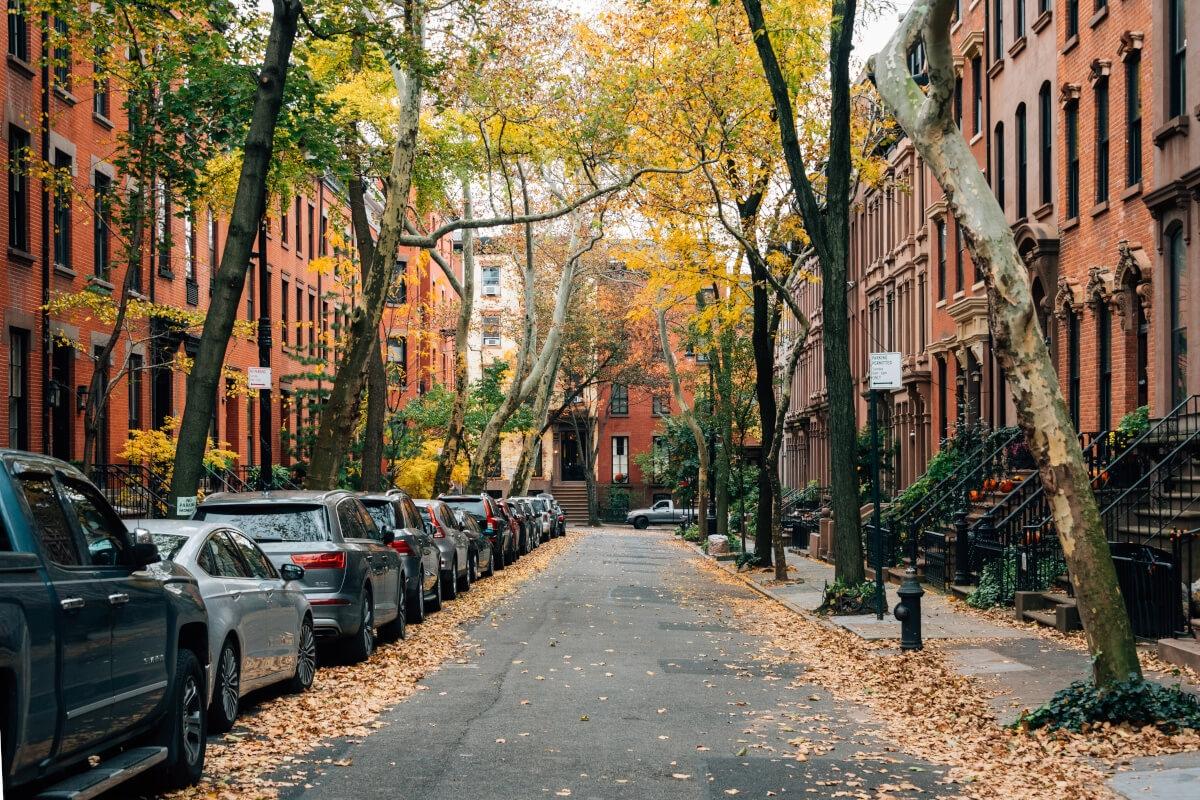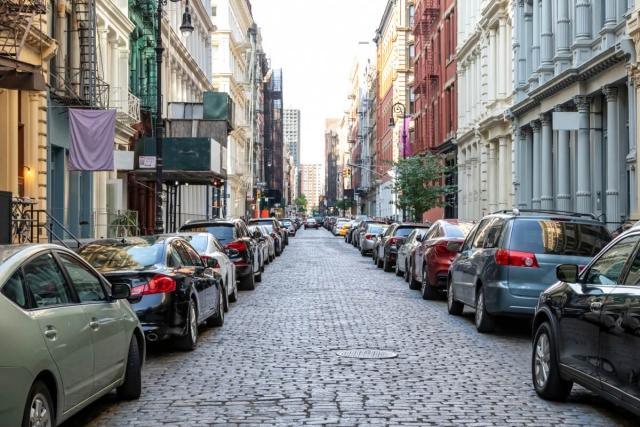New York City is a pedestrian’s paradise. With an impressive WalkScore® of 98, most daily errands and commutes can be accomplished on foot, leaving little need for a car. That said, owning or driving a car in NYC is still an option—just be prepared to face the unique challenges of city parking.
Parking in NYC requires a bit more time, attention, and effort than most cities. There are various rules you must follow, tons of pedestrians to watch out for, and, worst of all, costly fees to pay. However, with the right resources and understanding of NYC parking, you can successfully navigate the concrete jungle from the driver’s seat.
In this article, we’ll break down everything renters need to know about parking in NYC, including city mandates, parking options, and helpful tips for having a car in the city. Here’s a preview of what we’ll cover:
- NYC parking regulations
- Tenant parking rights in NYC
- NYC parking options for renters
- Tips for parking in NYC
Understanding NYC Parking Regulations
You’ll find parking regulations anywhere, but none as unique and stringent as what’s enforced in NYC. Given the city’s dense urban layout and high population count, local municipalities are quite particular about when and where residents can park.
New York City as a whole is a Tow Away Zone under the State’s Vehicle and Traffic Laws, meaning that any illegally parked vehicle is subject to towing. This also includes any car that has missing or expired registration or inspection stickers. Depending on the circumstances, residents can also be subject to parking tickets if engaging in illegal parking practices like parking near a fire hydrant or in a school zone when class is in session.
Alternate side parking and street sweeping
Alternate side parking (ASP) is enforced to allow for street cleaning, popularly known as street sweeping. Throughout the city, you’ll see ASP signs indicating days and times when parking is not permitted. During these periods, the streets must be cleared for street sweepers, who set out to clean litter and debris from bike lanes, sidewalks, and streets.
The ASP system follows a strict schedule, with rules in effect for specific days and times in each neighborhood. Residents must comply with this schedule and move their cars for these regular cleanings. Otherwise, they could be fined up to $65 for parking violations.
All that said, if you plan to have a car while renting a home in NYC, be prepared to move your car multiple times a week. While some apartments have parking garages, street parking is generally more common and inexpensive.

Tenant Parking Rights in NYC
Specific parking rules vary from property to property. The details will be outlined in your lease agreement in the form of a parking clause. If your contract doesn’t include a parking clause, then dictate parking decisions based on the following tenant rights:
- Right to safe and accessible parking: Tenants have the right to safe and accessible parking. This means having a well-lit, surveilled, and clean area to park.
- Protection from discrimination: The Fair Housing Act (FHA) outlaws discrimination in rental processes. For parking, this means that you are legally entitled to parking regardless of your race, color, national origin, religion, sex, familial status, or disability. If your landlord withholds parking due to any of these characteristics, they are in violation of the FHA and should be reported.
- Reasonable accommodations for disabilities: If you have a disability that requires special parking accommodations, you have the right to request those from your landlord or property manager.
The above-listed rights are implied for all renters. However, make sure to read your lease agreement carefully for specific rules and applications.
Exploring Parking Options in NYC
Earlier, we touched on street parking in NYC. But we didn’t expand upon the other types of parking throughout the city. Rental properties in the city offer other parking options, ranging from garages to even valet parking. Let’s take a look at some of the different options:
Assigned parking
If your lease agreement specifies assigned parking, that means you’ll have a designated spot to use. This space will be for your use and your use only, unless your landlord makes adjustments. However, if they do, they must provide proper notice and alternative access to another spot.
Open parking
Open parking is the opposite of assigned parking, meaning there are no pre-assigned spots for individual renters. In this case, all residents will have equal rights to the property’s spaces and will access them on a first-come, first-served basis.
Tandem parking
Tandem parking occurs when two or more vehicles park in a line. This stacked style is more common in driveway arrangements and requires more coordination between residents and neighbors.
Stacked parking
Stacked parking involves mechanically lifting cars and stacking them on top of one another. This allows more cars to fit without taking up more surface area, which is mighty convenient. However, the same can’t be said for when it’s time to retrieve your car, which requires coordination with management and residents.
Carports
Carports are covered parking areas without full enclosure. They offer protection from harsh weather conditions and are easily accessible.
Parallel parking
Parallel parking is very common in urban areas like New York City. This involves parking along the curb, parallel to the road. Though it's often linked to public parking, some rental properties offer designated parallel parking spots for residents.
Valet parking
Valet parking may be an option if you live in a luxury NYC building. This premium service offers round-the-clock parking attendance, meaning someone will park and retrieve your car for your arrival/departure.

Tips for Parking as an NYC Renter
As we said earlier, parking in the concrete jungle isn’t always easy. Between navigating traffic and avoiding pedestrians, the challenge of simply finding a parking spot can feel even more daunting. If you’re struggling to park at your rental property or throughout the city, here are some tips that should make things a bit easier.
Negotiate parking terms
If you’re unhappy with the parking clause in your lease, try to negotiate! Perhaps you’re looking for assigned parking or covered spaces. Whatever your needs are, don’t be afraid to voice them to your landlord or property manager. Though city parking is quite limited, they may be able to be flexible and adjust parking terms.
Take advantage of Sundays and holidays
ASP regulations do not apply on Sundays. So, if you’re looking to explore the city by car, or maybe you have a friend driving in, make your plans on Sunday to avoid parking fees and limitations. ASP rules also do not apply on federal holidays, so make sure to take advantage of those times too!
Stay informed about parking rule changes
City parking rules are always subject to change. So, make sure to keep a pulse on local mandates to avoid any potential tickets or towing. You can check for updates on the official NYC Department of Transportation website or download a parking app that provides real-time information on parking regulations and availability.
Explore Apartment for Rent in NYC on Apartments.com
With or without a car, apartment hunting in New York City can be stressful. With so many options to consider, from choosing a borough to the type of apartment you want, it’s hard to know where to start. This is where platforms like Apartments.com come in.
With our user-friendly search tools, you can filter your apartment search by neighborhood, price range, and amenities, like parking garages! Start your NYC apartment search today on Apartments.com and find your dream home in the Big Apple.
FAQs
Does NYC have residential parking permits?
According to the Official Website of the City of New York, New York City residents have the option to apply for parking permits at select city-owned lots and garages. Additionally, government employees, non-profit organizations, and clergy members may qualify for specialized permits allowing convenient parking near their workplaces.
How much is a monthly parking spot in NYC?
The cost of a monthly parking spot in NYC varies widely depending on the neighborhood. Prices can range from $200 to over $1,000 per month, with areas like Manhattan being significantly more expensive.
Can my landlord charge extra for parking in NYC?
Yes, landlords in NYC can charge extra for parking in some circumstances. Make sure to review your lease terms to confirm whether parking fees are separate or included in your rent.
Is alternative side parking enforced year-round?
Yes, alternate side parking is enforced year-round in NYC, except on Sundays, major holidays, or when officially suspended due to weather conditions or other special circumstances. Always check the city’s parking calendar to stay updated on enforcement schedules.






